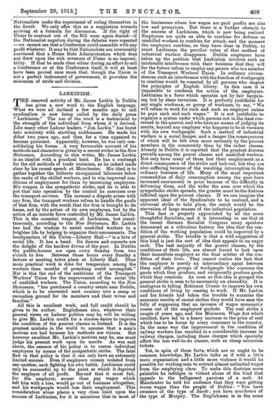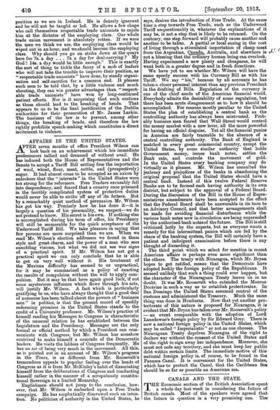LARKINISM. T HE renewed activity of Mr. James Larkin in Dublin
has given a new word to the English language. What we were all inclined a few months ago to call syndicalism is now being called by the daily press " Larkinism." The use of the word is a testimonial to the strength of the individual from whom it is derived. Like many other Labour leaders, "Jim Larkin" has burst into notoriety with startling suddenness. He made his debut two years ago, and then for a time appeared to become quiescent. Apparently, however, he was only con- solidating his forces. A very favourable account of his methods and character is given by a recent writer in the New Statesman. According to this writer, Mr. James Larkin is an idealist with a practical bent. He has a contempt for the old methods of trade unionism, as he indeed made clear by his recent speech at Manchester. His ideal is to gather together the hitherto unorganized labourers below the ranks of the skilled workers, and to win improved con- ditions of employment for them by terrorizing employers. His weapon is the sympathetic strike, and be is able to put that into operation by the control he exercises over the transport services. The moment a dispute arises with any firm, the transport workers refuse to handle the goods of that firm, with the result that the firm is brought to its knees, not by the action of its own employees, but by the action of an outside force controlled by Mr. James Larkin. This is the essential weapon of Larkinism, but simul- taneously, according to the New Statesman, Mr. Larkin has had the wisdom to assist unskilled workers to a brighter life by helping to organize their amusements. The headquarters of the Union—Liberty Hall—" is a hive of social life. It has a band. Its dances and concerts are the delight of the hardest driven of the poor. In Dublin the public-houses are open every Sunday from two o'clock to five. Between those hours every Sunday a lecture or meeting takes place at Liberty Hall. Thus more practical work is done for temperance among the workers than months of preaching could accomplish." Nor is this the end of the ambitions of the Transport Workers' Union for the improvement of the social life of unskilled workers. The Union, according to the New Statesman, " has purchased a country estate near Dublin, which is to be converted next summer into a camp or recreation ground for its members and their wives and families."
All this is excellent work, and full credit should be given to its author. Englishmen also, whatever their general views on Labour politics may be, will be willing to give Mr. Larkin credit for a sincere desire to improve the condition of the poorest classes in Ireland. It is the greatest mistake in the world to assume that a man's motives are bad because his methods are vicious. But however excellent Mr. Larkin's motives may be, one must judge his present work upon its merits. As was said above, the essence of his policy is to coerce individual employers by means of the sympathetic strike. The fatal flaw in that policy is that it can only have an extremely limited success. Even if employers remain isolated from one another, each fighting his own battle, Larkinism could only be successful up to the point at which it deprived the employer of all profit. Beyond that it must fail, for the employer, sooner than pay wages which left him with a loss, would go out of business altogether, and his workpeople would lose their employment. This consideration alone places a very close limit upon the success of Larkinism, for it is notorious that in most of the businesses where low wages are paid profits are also low and precarious. But there is a further obstacle to the success of Larkinism, which is now being realized Employers are quite as able to combine for defence as unskilled workers to combine for attack, and the moment the employers combine, as they have done in Dublin, to resist Larkinism the peculiar value of that method of industrial warfare disappears. Dublin employers have taken up the position that Larkinism involves such an intolerable interference with their business that they will for the future refuse to employ any person who is a member of the Transport Workers' Union. In ordinary circum- stances such an interference with the freedom of workpeople to combine would be resented by all persons who respect the principles of English liberty. In this case it is impossible to condemn the action of the employers. Larkinism is a force which operates not by fair bargain- ing but by sheer terrorism. It is perfectly justifiable for any single workman, or group of workmen, to say, " We will refuse to work for such and such an employer unless he pays such and such wages." It is not justifiable to organize a system under which persons not in the least con- cerned in the quarrel, and who have no means of judging its merits, boycott any employer who happens to be at variance with his own workpeople. Such a method of industrial warfare is a social danger, and a danger the consequences of which will be felt even more seriously by the poorest members in the community than by the richer classes. Already in Dublin it is reported that the greatest distress prevails among the poorer classes and unskilled workers. Not only have many of them lost their employment as a direct consequence of the strike and lock-out, but they are also suffering because of the resulting interruption to the ordinary business of life. Many of the most important commodities of daily consumption among the poor have increased enormously in price because of the difficulty in delivering them, and the wider the area over which the sympathetic strike spreads, the greater must be the distress inflicted upon the poorest classes. If we can imagine the apparent ideal of the Syndicalists to be realized, and a universal strike to take place, the result would be the starvation of large masses of the industrial population. This fact is properly appreciated by all the more thoughtful Socialists, and it is interesting to see that at the recent German Socialist Congress many speakers denounced as a ridiculous fantasy the idea that the con- dition of the working population could be improved by a general strike. The °trouble is that a wild suggestion of this kind is just the sort of idea that appeals to an angry mob. The vast majority of the poorer classes, by the conditions of their life, are almost forced to look upon their immediate employer as the final arbiter of the con- dition of their lives. They cannot realize the fact that the employer is merely an intermediary agent between them and other groups of workpeople who consume the goods which they produce, and reciprocally produce goods which they consume. As soon as this idea is grasped the general strike is seen to be necessarily an absurdity. It is analogous to telling Robinson Crusoe to improve his own conditions of living by ceasing to work. If Mr. Larkin and his friends had taken the trouble to examine the economic results of recent strikes they would have seen the folly of supposing that an increase of wages necessarily comes out of the employers' pockets. The coal strike a couple of years ago, and the Minimum Wage Act which resulted, have led to a heavy increase in the price of coal which has to be borne by every consumer in the country. In the same way the improvement in the condition of railway workers has resulted in a considerable increase in railway charges, including those charges which specially affect the less well-to-do classes, such as cheap excursion tickets.
Yet, in spite of these facts, which are or ought to be common knowledge, Mr. Larkin talks as if with a little more organization and a little more violence it would be possible for working men to extract almost unlimited wages from the employing class. To make this doctrine more palatable be indulges in violent abuse of the kind that appeals to the belligerent passions of a mob. At Manchester he told his audience that they were getting worse wages than the people of Dublin : " You have sweaters of the type of Jacob ; you have murderers of the type of Murphy. The Englishman is in the same position as we are in Ireland. He is densely ignorant and he will not be taught or led. He allows a few chaps who call themselves respectable trade unionists to cajole him at the dictates of the employing class. Our whole trade union movement is absolutely rotten. If we were the men we think we are, the employing class would be wiped out in an hour, and we should become the employing class. Why should you go on strike down at the quays here for 7s. a day . . . 7s. a day for deal-carrying ? My God ! 14s. a day would be little enough." This is exactly the sort of thing to tickle the fancy of a mob of loafers who will not take the trouble to improve their position, as " respectable trade unionists " have done, by steady organi- zation and self-sacrifice for a common end. It pleases such men to be told that, by a little violence and much shouting, they can win greater advantages than " respect- able trade unionists " have won by long-continued patient efforts. Nor is it surprising that such orations as these should lead to the breaking of heads. That appears to us to be the final justification of the Dublin authorities for their prosecution of Mr. James Larkin. The business of the law is to prevent, among other things, the breaking of heads, and therefore the law rightly prohibits speech-making which constitutes a direct incitement to violence.











































 Previous page
Previous page